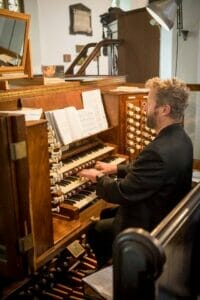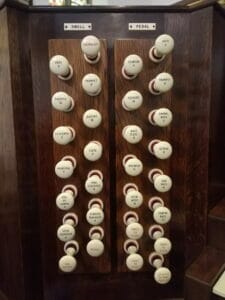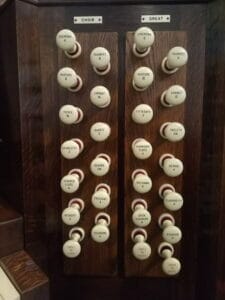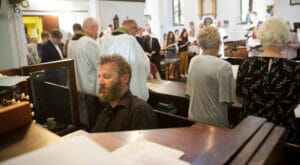Our Organ Appeal 2020

From our Director of Music
We are well on the way to having the work done on our wonderful organ to ensure it remains in first class condition for the coming decades. We have already had a number of generous donations and we are extremely grateful for these. As part of our fundraising we are also inviting people to sponsor an organ drawstop. These will be fully replaced at a cost of £150 each. Donors may wish to sponsor one or more stops, either in name or anonymously, or perhaps in memory of a loved one.
There will be a commemorative frame showing which stops have been sponsored and any name requested by donors. There are 46 speaking stops on Holy Trinity organ, perhaps soon to be 47, ranging from fiery reeds to soothing strings and each has its own special quality.


*Flue stops- These are mostly divided into Diapason, Flute, and String types. The diapason type is the classic, typical organ pipe both in sound and appearance. Flute pipes have a stopper in the end and produce a sound similar to a recorder or transverse flute. String stops are a form of quiet diapason and are very gentle.
*Reed stops- Believe it or not these pipes work in a similar way to a harmonica and can range from a delicate Oboe or Cremona, to a fiery Trumpet or Posaune (Trombone)
*Mutations and Mixtures- These are very special and important stops using ingenious acoustic techniques to create overtones that add brightness and timbral changes to the foundation stops. Without them the organ would be very dull indeed !
Most stops have a number. This refers to the length of the longest pipe in the rank in feet. Shorter pipes produce higher notes, longer pipes produce lower notes. The organ is made up of 4 divisions- Great, Swell, Choir and Pedal. The longest pipes produce bass notes on the Pedal organ.
Included is a list of the speaking stops at Holy Trinity. They are marked as Diapason type (D), Flutes (F), Strings (S), Reeds (R), Mixtures and Mutations (M).
Our organ also has 10 drawstops called couplers. These control linking mechanisms in the organ. Although they do not produce a sound they are essential to the functioning of the organ. People are invited to sponsor these at £50 each.

You might want to choose a stop or leave it to the Church to decide. If you want to find out what the stops sound like, or to know more about the organ in general, please speak to one of the organists or Fr Paul.
If you would like to make a donation but would prefer nor to sponsor a stop then you are very welcome. Sherri is devising a number of fun ways to do this which will be ready very soon.
Steve Ansell
